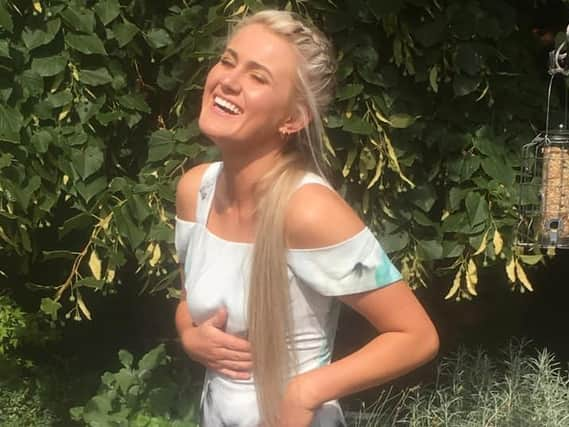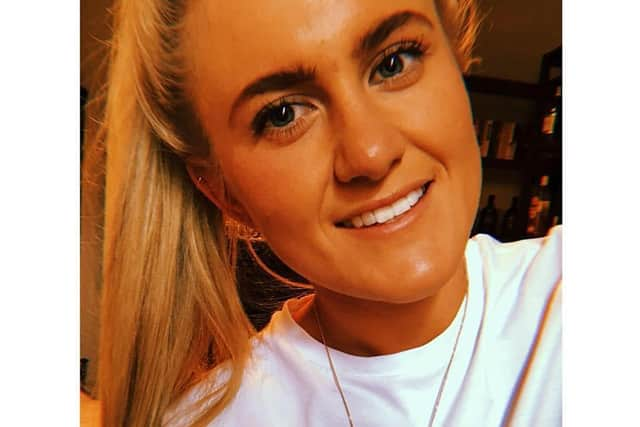'Opportunities missed' in fight to save Fleetwood woman who battled rare infection for two years before dying in hospital


Coral O’Donnell, 25, of Mount View, died of respiratory failure caused by necrotizing pneumonia on May 17 2019 after spending four months in intensive care with an ‘extremely rare’ Panton Valentine Leukocidin infection.
At her inquest this week, coroner Alan Wilson heard how Miss O’Donnell, a fishmonger, had suffered from recurring abscesses and skin infections for 18 months before appearing at Blackpool A&E on January 10 in a critical condition.
Advertisement
Hide AdAdvertisement
Hide AdShe was transferred to the ICU for further observation, where her condition worsened. She was put on a ventilator and arrangements were made for her to undergo a bronchoscopy.


Despite showing a number of symptoms of PVL, including a low white blood cell count, doctors did not suspect she was suffering from the rare infection until she had a scan on January 21.
But Blackpool Vic microbiologist Dr Ruth Palmer said that clinicians should have suspected PVL on the day Miss O’Donnell first arrived at the hospital.
Notes about her history of skin infections - another PVL red flag- were passed around but were not communicated verbally, which Dr Palmer said was a result of insufficient numbers of staff.
Advertisement
Hide AdAdvertisement
Hide AdHanding down a conclusion of natural causes yesterday, coroner Alan Wilson said: “The initial suggestion of PVL, one doctor felt it should have been considered between January 11 and January 17. I find that this is slightly late. Dr Palmer felt that PVL ought to have been considered on the 10th. This was a missed opportunity in identifying PVL.
“Around January 21 when PVL was identified, significant damage to Coral’s lungs was ongoing and she wasn’t receiving medication that could have helped her.”
He said, however, that even if Miss O’Donnell had received the antibiotics earlier, there was no guarantee that her life would have been saved.
One independent expert, Dr James Gray, put her chances of survival at less than 50 per cent.
Advertisement
Hide AdAdvertisement
Hide AdThe court previously heard how Miss O’Donnell had attended her GP, local walk-in centre, and Blackpool Victoria Hospital after picking up the PVL infection in late 2017.
On November 8 2018 she was seen by Dr Ayesha Ahmed at Fleetwood Surgery, who prescribed a course of antibiotics for an abscess on Miss O’Donnell’s face on her request, following on from another course of the drug she had received five days earlier.
Dr Ahmed also arranged a blood test for diabetes, a possible cause of recurring skin problems, but this came back normal and so was not followed up by the practice.
On January 8 Miss O’Donnell attended the Fleetwood walk-in centre with a cough and cold-like symptoms, including a headache, eye ache and throat pain. She was examined by nurse Sara Davies, who found ‘no evidence of a bacterial infection’.
Advertisement
Hide AdAdvertisement
Hide AdFollowing this, the court heard, Miss O’Donnell phoned her sister ‘in tears’ as she felt she had not been taken seriously.
Two days later, she was taken by ambulance to Blackpool Victoria Hospital in a critical condition. The doctor who saw her, Dr Robert Downes, said her symptoms were so severe he thought she was possibly suffering from undiagnosed leukaemia.
Mr Wilson said: “Dr Gray said that by the time Coral arrived at hospital she had a less than 50 per cent chance of survival. Had treatment been provided earlier, Coral may have survived, but we can’t say she would have survived, considering how rare and serious her condition was.
“By the time PVL was identified, she was at serious risk of dying, and was in fact probably going to die. There was a lack of awareness of PVL at the time.”
Advertisement
Hide AdAdvertisement
Hide AdMiss O’Donnell was transferred to Wythenshawe Hospital, the North West specialist for respiratory care, on March 18 with the intention of weaning her off the invasive ventilation treatment she was receiving. However, her chances of survival at this stage were low.
Dr Andrew Bentley, of Wythenshawe’s ICU, said: “In the context of PVL pneumonia, with evidence of severe necrotising and hemorrhaging (coughing up blood), the survivability can actually be very low, irrespective of what we do. Mortality can be as high as 80 per cent.
“If antibiotics that may reduce the toxin formation are given early, that may improve the outcome. But I think it’s very uncertain. It’s likely that Coral’s chance of mortality at presentation was very high.”
She was suffering from necrotizing pneumonia, a severe form of pneumonia, and cavities in her lungs due to influenza, which had developed as a result of the infection that had weakened her immune system.
Advertisement
Hide AdAdvertisement
Hide AdDr Bentley said: “There was clearly severe damage, with lung cavitation on the chest x-ray. But I think from previous experiences with severe pneumonia, we have had patients survive. We’ve indicated what the mortality rate is, and it’s a very high mortality rate, as high as 80 per cent, but it can be very difficult to predict.
“When I saw Coral when she first arrived at Wythenshawe Hospital I was very, very concerned and had serious concerns as to whether she would survive. But I wouldn’t say that it was completely hopeless at that time.”
Miss O’Donnell continued to receive treatment in the ICU. There were attempts to help her get out of bed, but these were ‘severely impaired by her low oxygen levels’.
A CT scan on May 3 showed lung damage, dilated airways and mucus plugs in Miss O’Donnell’s system.
Three days later, her condition deteriorated rapidly.
Advertisement
Hide AdAdvertisement
Hide AdICU consultants discussed her situation, including the possibility of extracorporeal membrane oxygenation, a machine that draws blood from the body to allow the artificial oxygenation of the red blood cells and removal of carbon dioxide. However, her deterioration was so serious that she was no longer suitable for the treatment.
Dr Bentley said: “The doctors felt at that stage that her condition was acutely life-threatening.”
Following prompting from Miss O’Donnell’s family, doctors agreed to place her on a machine for a week, during which time her condition was ‘relatively stable’. But when the machine was removed, she immediately deteriorated again.
“Unfortunately, ECMO doesn’t treat underlying diagnoses. It isn’t a device that can be used for a sustained and long period,” Dr Bentley said. “The situation was unfortunately irretrievable at that point.”
Miss O’Donnell died on May 17 surrounded by her family.
Advertisement
Hide AdAdvertisement
Hide AdThe court heard that Blackpool Victoria Hospital had taken measures to inform its clinical staff about PVL following Miss O’Donnell’s case.
Mr Wilson said he would write a section 28 letter to the hospital about the lack of communication among its staff and the insufficient staff numbers brought up by Dr Palmer in the interest of preventing future deaths.
He also said he would write a section 28 letter to the Blackpool, Wyre and Fylde CCG about PVL.
He said: “It seems to me there’s a risk of future deaths in the absence of awareness of PVL and skin infections in otherwise healthy young people.”
What is Panton Valentine Leukocidin?
Advertisement
Hide AdAdvertisement
Hide AdPanton valentine leukocidin, or PVL, is a toxin that can kill white blood cells, and thus destroy the immune system.
The bacteria itself is not uncommon, and a person who picks it up may experience only mild symptoms, or none at all. Serious infections resulting from the toxin are extremely rare.
As such, PVL was not suspected in Miss O’Donnell’s case until 11 days after she was taken by ambulance to Blackpool Victoria Hospital in a critical condition.
Dr Ayesha Ahmed, who examined Miss O’Donnell on November 8, told the inquest that she had ‘never heard of’ PVL. An independent expert, Dr Ian Isaacs, said: “I have been in practice since 1981 and I have never heard of PVL. I have never seen it as a clinical diagnosis and I have never encountered it as an expert witness, which I have been doing since 1994.”
Advertisement
Hide AdAdvertisement
Hide AdICU consultant Dr Robert Downes, who saw Miss O’Donnell when she came into A&E on January 10 2019, said he had never seen a case of PVL infection in his 25-year career.
Another expert, microbiologist Dr James Gray, said such infections were ‘extremely uncommon’ and difficult to treat.
However, Blackpool Vic microbiologist Dr Ruth Palmer said Miss O’Donnell should have received treatment for PVLthe day she went into hospital as she was showing symptoms of the infection, including a low white blood cell count.